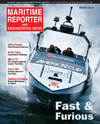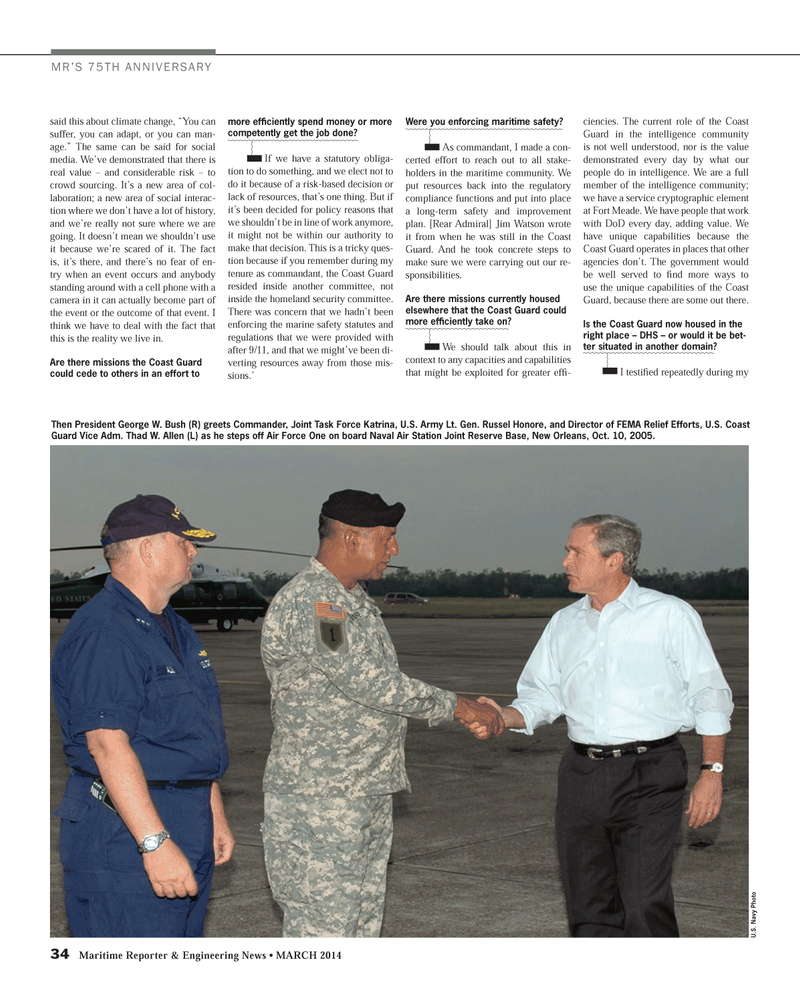
Page 34: of Maritime Reporter Magazine (March 2014)
U.S. Coast Guard Annual
Read this page in Pdf, Flash or Html5 edition of March 2014 Maritime Reporter Magazine
34 Maritime Reporter & Engineering News • MARCH 2014
MR’S 75TH ANNIVERSARY said this about climate change, “You can suffer, you can adapt, or you can man- age.” The same can be said for social media. We’ve demonstrated that there is real value – and considerable risk – to crowd sourcing. It’s a new area of col- laboration; a new area of social interac- tion where we don’t have a lot of history, and we’re really not sure where we are going. It doesn’t mean we shouldn’t use it because we’re scared of it. The fact is, it’s there, and there’s no fear of en- try when an event occurs and anybody standing around with a cell phone with a camera in it can actually become part of the event or the outcome of that event. I think we have to deal with the fact that this is the reality we live in.
Are there missions the Coast Guard could cede to others in an effort to more effi ciently spend money or more competently get the job done? If we have a statutory obliga- tion to do something, and we elect not to do it because of a risk-based decision or lack of resources, that’s one thing. But if it’s been decided for policy reasons that we shouldn’t be in line of work anymore, it might not be within our authority to make that decision. This is a tricky ques- tion because if you remember during my tenure as commandant, the Coast Guard resided inside another committee, not inside the homeland security committee.
There was concern that we hadn’t been enforcing the marine safety statutes and regulations that we were provided with after 9/11, and that we might’ve been di- verting resources away from those mis- sions.’
Were you enforcing maritime safety? As commandant, I made a con- certed effort to reach out to all stake- holders in the maritime community. We put resources back into the regulatory compliance functions and put into place a long-term safety and improvement plan. [Rear Admiral] Jim Watson wrote it from when he was still in the Coast
Guard. And he took concrete steps to make sure we were carrying out our re- sponsibilities.
Are there missions currently housed elsewhere that the Coast Guard could more effi ciently take on? We should talk about this in context to any capacities and capabilities that might be exploited for greater effi - ciencies. The current role of the Coast
Guard in the intelligence community is not well understood, nor is the value demonstrated every day by what our people do in intelligence. We are a full member of the intelligence community; we have a service cryptographic element at Fort Meade. We have people that work with DoD every day, adding value. We have unique capabilities because the
Coast Guard operates in places that other agencies don’t. The government would be well served to fi nd more ways to use the unique capabilities of the Coast
Guard, because there are some out there.
Is the Coast Guard now housed in the right place – DHS – or would it be bet- ter situated in another domain? I testifi ed repeatedly during my
U.S. Navy Photo
Then President George W. Bush (R) greets Commander, Joint Task Force Katrina, U.S. Army Lt. Gen. Russel Honore, and Director of FEMA Relief Efforts, U.S. Coast
Guard Vice Adm. Thad W. Allen (L) as he steps off Air Force One on board Naval Air Station Joint Reserve Base, New Orleans, Oct. 10, 2005.
MR #3 (32-41).indd 34 3/4/2014 10:51:20 AM

 33
33

 35
35
